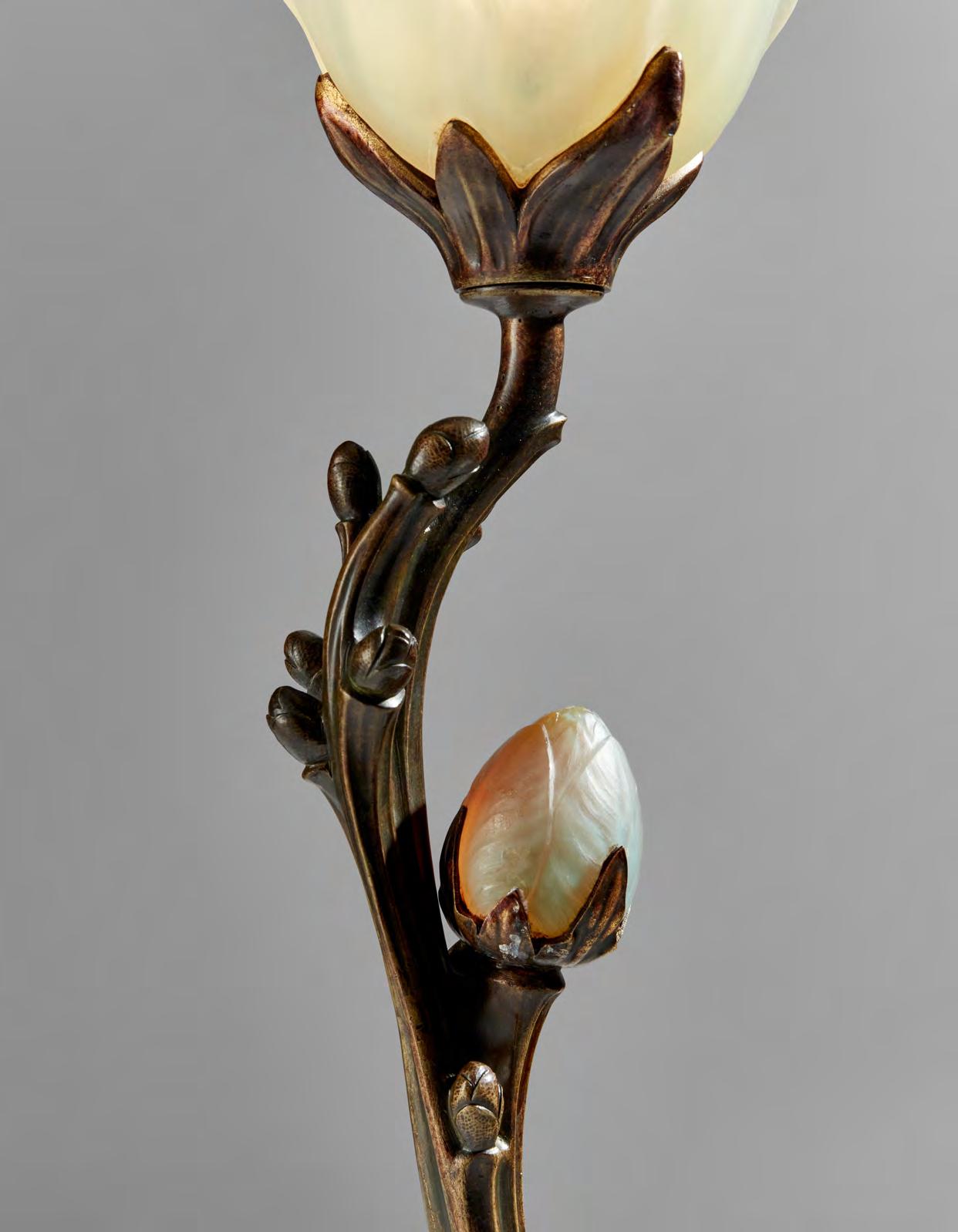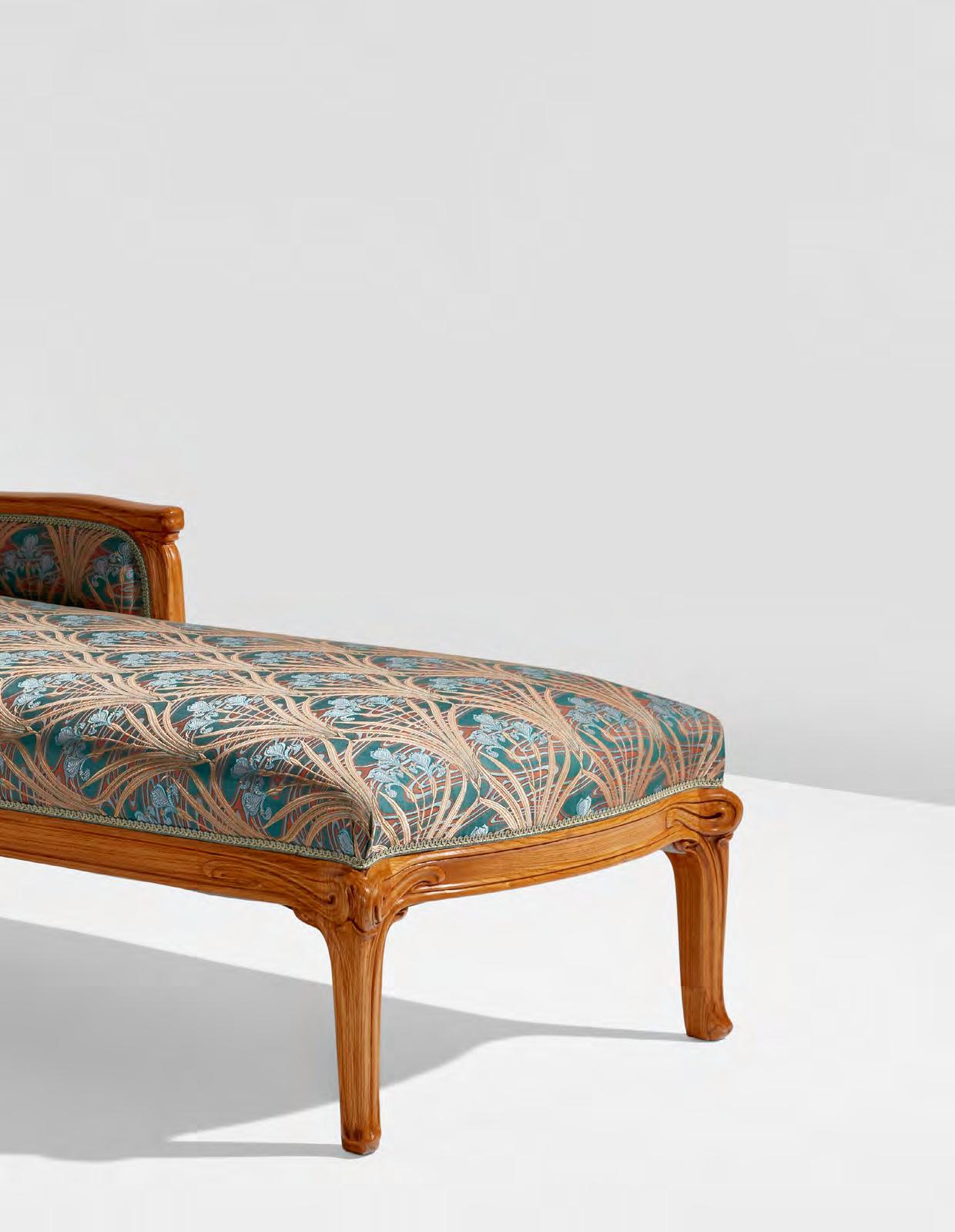








On the occasion of offering an exceptional group of Art Nouveau from an important private collection, Luke T. Baker considers the advent of artistic lighting concurrent with electrification and the incandescent light bulb. Styling and photography in the showroom of Studio Giancarlo Valle reimagines the category in a contemporary setting.
By Luke T. BakerOn the cusp of the 20th century, designers in France, Belgium, Great Britain and beyond brought together two complementary and dynamic developments that would come to symbolize the progressive home: electric lighting and the emphatically forward-thinking Art Nouveau style. These six exquisite table lamps by French Art Nouveau masters Émile Gallé, Louis Majorelle, Maurice Boval, and the Daum glassworks assert a newfound sense of aesthetic freedom made possible by the advent of electricity. Each work embodies a highly unique reflection of the ways these artists, craftsmen, and glassworkers defined the new artistic forms that gave shape to this thoroughly modern mode of illumination.
No modern-era innovation has been as transformative on the domestic interior as the introduction of electric lighting. After tens of thousands of years of relying on smoky candles, finicky oil lamps, and dangerous gas jets to stave off the darkness, electric-powered light began to enter our homes (and workplaces, schools, and public places) beginning in the 1880s. While early examples of electric lighting emerged in the first decades of the 19th century, it wasn’t commercially viable until the introduction of the vacuum-sealed incandescent bulb, perfected almost simultaneously by British chemist Sir Joseph Swan (1878) and American inventor Thomas Alva Edison (1879). The electricpowered incandescent lamp marked a sea change from the prevailing paradigm of combustion lighting, delivering clean, safe, and reliable illumination at the touch of a button. For those early adopters who could afford such a novelty, it was a life-changing—if still mysterious—means of bringing brightness into the home without the maintenance, mess, and hazard of fuel-burning lamps.
Before this point, the design of domestic lighting was, in large part, governed by the practical requirements of the format. Open flames, fuel reservoirs, glass chimneys, drip collectors, and connection to gas lines dictated what lamps could look like, and often, where they could be located. Electric lamps, conversely, needed only a cord, bulb, and optional shade, enabling designers to divorce form from function and take lighting to new levels of artistry and abstraction. In the hands of designers like Gallé and Majorelle, lamps assumed Art Nouveau’s signature linework and organic motifs, becoming domestic sculptures resembling flowers and plants. Their intricate metalwork bases evoked vining tendrils or naturalistic stems, supporting art glass shades (a French specialty) that emphasized color and texture and revisited ancient glassworking techniques with new vitality. Lighter and more sculptural than the ornately decorated combustion lamps that preceded them, these stylized electric lamps could be easily moved from room to room to bring visual interest and focused lighting to tablescapes, fireplace mantels, and writing desks.
The gorgeous Nénuphar lamp, produced by Majorelle with the Nancy-based Daum Frères studio around 1903, exemplifies Art Nouveau’s rejection of historicist styles and intense interest in nature. This water lily-inspired lamp is perched on a patinated bronze stalk, as though emerging from a pond flanked by a trio of frogs. The flower-shaped glass shade exhibits the beautiful effect of colored glass, carefully layering the petals’ soft pink with the translucent green veining of a naturalistically rendered leaf. A tiny insect of jewel-like applied glass adorns the blossom on each side. Majorelle and Daum’s design introduced the novel artistic possibilities of Art Nouveau lighting to audiences at both regional and national exhibitions, and today, variant examples of this important work can be found in the collections of the Musée D’Orsay and the Museum of Modern Art.
The flower-inspired electric lamp was ideal for showcasing the marvel of the incandescent bulb, unlike many combustionfueled contemporaries that sought to conceal the burning gas jet or the mantle mechanism of an oil lamp. In Majorelle’s alluring Magnolia lamp from 1904, the bare, clean-burning bulb is nestled within the open petals of the namesake bloom, masterfully rendered in opalescent glass by Daum Frères and perched on a stylized bronze branch complete with buds. The distinctive Chardon lamp also shows off the aesthetic possibilities engendered by the small, smokeless bulb. An elongated and highly naturalistic bronze stalk created by Maurice Bouval cradles a glowing purple thistle head made from translucent etched glass (also by Daum Frères)—a precious glass globe within a precious glass globe. (The thistle, or chardon in French, is significant as a symbol of the Lorraine region, home to the Daum studio, and the École de Nancy, both prolific centers for Art Nouveau design.)
Two examples by Gallé, the colorful Lotus table lamp from c. 1900 and the spectacular mushroom-shaped Ombelle lamp from about 1903 both sit atop elegant decorative glass bases with bronze or wrought iron supports. With only a thin cord bringing steady power to the light source, Gallé’s graceful, stem-like natural forms are unencumbered by bulky fuel reservoirs, fill spouts for replenishing oil or kerosene, knobs for controlling the flame height, or complex clockwork and springloaded mechanisms for bringing the fuel to the wick.
A flower-inspired circa 1900 metal and glass table lamp, also by Gallé, compellingly captures one of the most significant design opportunities designers exploited with new flameless electric lighting. Whereas the light source in a combustible lamp always needs to be oriented upright with the direction of the flame, the electric bulb is uniquely able to function flawlessly and direct light at any angle, even when pointed straight down. The Gallé lamp features a sinuous, patinated bronze base perched on coiling tendrils and a realistically modeled leaf, but its most striking feature is the red shade of cased and etched glass, which hangs downward like a bell-shaped flower to cast its light upon a desk or table.
These six Art Nouveau table lamps are charged with a vivacious spirit that captures the energy and excitement of the electric age. The invisible, abstract concept of electricity and the unique properties of the incandescent bulb invited Art Nouveau designers to look to the natural realm for organic inspiration. Liberated from the functional mandates and historic precedent of the combustion flame, each lamp expresses a modern reimagining of the form, fit for illuminating our modern new world.

67. Émile Gallé 1846-1904
Lotus table lamp

circa 1900
Overlaid, acid-etched, internally streaked, and fire-polished glass, patinated bronze. 18 in. (45.7 cm) high Stem cameo signed Gallé
Estimate
$20,000-30,000
Provenance

Macklowe Gallery Ltd., New York Acquired from the above by the present owner, 2007
Literature
Janine Bloch-Derman, L’Art du Verre en France, 1860-1914, Lausanne, 1974, p. 91 for a similar example
Philippe Garner, Émile Gallé, New York, 1976, p. 149 for a similar example
Alastair Duncan and Georges de Bartha, Gallé Lamps, Suffolk, 2014, p. 19 for a similar example
Property from an Important Private Collection
68. Eugène Gaillard 1862-1933
Set of five nesting tables
circa 1913
Maple, burl walnut-veneered wood.
Central table: 28 5/8 x 27 5/8 x 27 5/8 in. (72.7 x 70.2 x 70.2 cm)

Each nesting table: 27 1/8 x 17 1/2 x 11 1/2 in.
(68.9 x 44.5 x 29.2 cm)

Estimate $10,000-15,000
Provenance
Impulsion B, Paris
Acquired from the above by the present owner, 2001
Literature
M. P. Verneuil, “Le Salon de la Société des Artistes Décorateurs en 1913,” Art et Décoration, March 1913, p. 96
Alastair Duncan, The Paris Salon 18951914, Volume III: Furniture, Woodbridge, 1996, p. 217
“Nénuphar” table lamp
circa 1903
Wheel-carved, overlaid, acid-etched and applied glass, patinated bronze.
27 5/8 in. (70.2 cm) high
Shade engraved DAUM/NANCY and with the Cross of Lorraine.
Estimate
$120,000-180,000

Provenance
Private collection
Christie’s, New York, “Important 20th Century Decorative Art & Design,” June 5, 2007, lot 48
Acquired from the above by the present owner
Exposition de l’Alliance Provinciale des Industries d’Art. Ecole de Nancy: Catalogue Officiel Illustré, 1903, Paris, n.p. Alastair Duncan, Louis Majorelle: Master of Art Nouveau Design, New York, 1991, pp. 139, 149, 215
Victor Arwas, Art Nouveau: The French Aesthetic, London, 2002, p. 292
Christophe Bardin, Daum 1878-1939: Une Industrie d’Art Lorraine, Metz, 2004, p. 303
Masterpieces of Art Nouveau Furniture: The Majorelle Catalogue ca. 1910, New York, 2002, pl. 92
Julius Hoffmann Jr., The Modern Style, 1899-1905: Art Nouveau, 2006, Bonn, pp. 197, 273
Roselyne Bouvier, Majorelle: Un Art de Vivre Moderne, Nancy, 2009, p. 143 for a similar example
The present lamp is the only known “Nénuphar” example to feature the application of mold-blown scarabs on the shade.

Pair of side chairs

circa 1900
Ash, fabric upholstery.
Each: 34 1/4 x 14 5/8 x 15 7/8 in. (87 x 37.1 x 40.3 cm)

Estimate
$3,000-5,000
Provenance
Raymond Toupenet, Paris
Acquired from the above by the present owner, 2001
Literature
G.M. Jacques, “L’Intérieur Rénové,” L’Art Décoratif, September 1900, pp. 222, 224
Philippe Jullian, The Triumph of Art Nouveau: Paris Exhibition 1900, New York, 1974, p. 119
Gabriel P. Weisberg, Art Nouveau Bing: Paris Style 1900, New York, 1986, pp. 188, 190
Ian Millman, Georges de Feure: Maître du Symbolisme et de l’Art Nouveau, Paris, 1992, p. 154
Ian Millman, Georges de Feure, 1986-1943, Amsterdam, 1993, pp. 21, 84 Alastair Duncan, The Paris Salon 1895-1914, Volume III: Furniture, Woodbridge, 1996, pp. 126-27
The present model chairs were presented at the L’Art Nouveau pavilion at the Exposition Universelle of 1900, Paris.



“Magnolia” table lamp

circa 1904
Opalescent blown glass, patinated bronze. 23 5/8 x 8 1/2 x 6 1/2 in. (60 x 21.6 x 16.5 cm)
Shade engraved DAUM/NANCY and with Cross of Lorraine, base incised L Majorelle/Nancy
Estimate
$30,000-50,000
Provenance

Macklowe Gallery Ltd., New York
Acquired from the above by the present owner, 2004
Literature
Janine Bloch-Derman, L’Art du Verre en France, 1860-1914, Lausanne, 1974, p. 138 for a similar example
Noël Daum, Daum: Mastery of Glass, Lausanne, 1980, p. 147
Alastair Duncan, Louis Majorelle: Master of Art Nouveau Design, New York, 1991, pp. 146, 215
Alastair Duncan, The Paris Salon 18951914, Volume V: Objets d’Art & Metalware, Woodbridge, 1999, p. 396 Masterpieces of Art Nouveau Furniture: The Majorelle Catalogue ca. 1910, New York, 2002, pl. 32
Julius Hoffmann Jr., The Modern Style, 18991905: Art Nouveau, 2006, Bonn, p. 221 Roselyne Bouvier, Majorelle: Un Art de Vivre Modern, Paris, 2009, p. 99
Property from an Important Private Collection
Pair of rare sellettes
circa 1900
Fruitwood, fruitwood-veneered wood. Each: 45 1/4 x 13 1/2 x 13 in. (114.9 x 34.3 x 33 cm)

Estimate $6,000-8,000
Raymond Toupenet, Paris
Acquired from the above by the present owner, 2002
Literature
Alastair Duncan, Louis Majorelle: Master of Art Nouveau Design, New York, 1991, p. 31 for the occasional table version
Alastair Duncan, The Paris Salon 18951914, Volume III: Furniture, Woodbridge, 1996, p. 391 for the occasional table version


Flowering maple table lamp
circa 1920
Cameo acid-etched glass. 19 in. (48.3 cm) high
Base cameo signed Gallé.
Estimate $6,000-8,000
Provenance
Georges Fasa, Paris
Acquired from the above by the present owner, 2000
Literature
Alastair Duncan and Georges de Bartha, Gallé Lamps, Suffolk, 2014, pp. 94-95, 97-99 for similar examples


Property from an Important Private Collection
74. Émile Gallé 1846-1904
“Libellules” guéridon
circa 1900
Walnut, oak, burl oak, pearwood, and mahogany marquetry-veneered wood
30 1/8 x 24 x 24 1/2 in. (76.5 x 61 x 62.2 cm)

Top signed Gallé in the marquetry.

Estimate
$30,000-50,000
Macklowe Gallery, New York
Roberta and Bruce Brauston, Ohio, acquired from the above, 1981 Macklowe Gallery Ltd., New York, acquired from the above
Acquired from the above by the present owner, 2006
Literature
Bernd Hakenjos and Sigrid Barten, Émile Gallé: Keramik, Glas und Möbel des Art Nouveau, Zürich, 1980, p. 98
Tim Newark, The Art of Émile Gallé, London, 1989, p. 28
Alastair Duncan, The Paris Salon 18951914, Volume III: Furniture, Woodbridge, 1996, p. 225
75. Émile Gallé 1846-1904
Table lamp

circa 1900
Cased and acid-etched glass, patinated bronze.
20 1/4 x 12 3/8 x 10 1/2 in. (51.4 x 31.4 x 26.7 cm)

Shade engraved Gallé.
Estimate
$6,000-8,000
Provenance
Macklowe Gallery Ltd., New York Acquired from the above by the present owner, 2006
Literature
Alastair Duncan and Georges de Bartha, Gallé Lamps, Suffolk, 2014, pp. 35, 65 for similar examples
Property from an Important Private Collection
Guéridon
circa 1902
Fruitwood, fruitwood-veneered wood. 30 1/4 x 25 1/2 x 25 1/2 in. (76.8 x 64.8 x 64.8 cm)


Estimate $3,000-5,000
Raymond Toupenet, Paris
Acquired from the above by the present owner, 2002
Literature
Alastair Duncan, Louis Majorelle: Master of Art Nouveau Design, New York, 1991, p. 31
Alastair Duncan, The Paris Salon 18951914, Volume III: Furniture, Woodbridge, 1996, p. 391



Property from an Important Private Collection
77. Émile Gallé 1846-1904
“Ombelle” table lamp
circa 1903
Overlaid, acid-etched and wheel-polished glass, patinated wrought iron.
31 in. (78.7 cm) high Shade cameo signed Gallé
Estimate
$25,000-35,000

Raymond Toupenet, Paris
Acquired from the above by the present owner, 2002
Literature
Armand Guérinet, ed., Exposition Lorraine: L’École de Nancy au Musée de l’Union Centrale des Arts Décoratifs, Paris, 1903, pl. 4 for a similar example
Philippe Garner, Émile Gallé, London, 1976, p. 48 for a similar example
Alastair Duncan, The Paris Salon 1895-1914, Volume IV: Ceramics & Glass, Woodbridge, 1998, p. 222 for a similar example
Victor Arwas, Art Nouveau: The French Aesthetic, London, 2002, p. 285 for a similar example
Alastair Duncan and Georges de Bartha, Gallé Lamps, Suffolk, 2014, pp. 28-29, 70-71 for similar examples

Property from an Important Private Collection
78. Louis Majorelle 1859-1926
“La Cascade” cabinet

circa 1899
East Indian rosewood, Macassar ebony, walnut, olive wood, mahogany, oak, lacewood, and mother of pearl marquetryveneered wood, fabric.
66 x 31 1/2 x 15 3/4 in. (167.6 x 80 x 40 cm)

Estimate $60,000-80,000
Provenance
Macklowe Gallery Ltd., New York
Acquired from the above by the present owner, 2004
Literature
“Salon de 1899,” L’Art Décoratif, June 1899, p. 119
René Dulong, “La Sculpture Décorative aux Salons,” Art et Décoration, August 1899, p. 44
Roberta Waddell, ed., The Art Nouveau Style, New York, 1977, p. 200
Alastair Duncan, Louis Majorelle: Master of Art Nouveau Design, New York, 1991, p. 31
Alastair Duncan, The Paris Salon 18951914, Volume III: Furniture, Woodbridge, 1996, p. 395
Julius Hoffmann Jr., The Modern Style, 1899-1905: Art Nouveau, 2006, Bonn, p. 40

Property from an Important Private Collection
79. Georges de Feure 1864-1943
Chaise longue

circa 1900
Ash, fabric upholstery.
30 3/4 x 28 1/2 x 76 1/4 in. (78.1 x 72.4 x 193.7 cm)

Estimate
$4,000-6,000
Provenance
Raymond Toupenet, Paris
Acquired from the above by the present owner, 2001
Literature
G.M. Jacques, “L’Intérieur Rénové,” L’Art Décoratif, September 1900, p. 222
Gustave Soulier, “Les Sièges,” Art et Décoration,” November 1901, p. 20
Philippe Jullian, The Triumph of Art
Nouveau: Paris Exhibition 1900, New York, 1974, p. 119
Roberta Waddell, ed., The Art Nouveau Style, New York, 1977, p. 231
Gabriel P. Weisberg, Art Nouveau Bing: Paris Style 1900, New York, 1986, p. 188
Ian Millman, Georges de Feure: Maître du Symbolisme et de l’Art Nouveau, Paris, 1992, p. 154
Ian Millman, Georges de Feure, 1986-1943, Amsterdam, 1993, p. 21
Alastair Duncan, The Paris Salon 18951914, Volume III: Furniture, Woodbridge, 1996, p. 126
The present model chaise longue was presented at the L’Art Nouveau pavilion at the Exposition Universelle of 1900, Paris.
80. Daum Frères and Maurice Bouval and 1863-1916
“Chardon” table lamp
circa 1903
Acid-etched glass, patinated bronze. 20 3/4 in. (52.7 cm) high

Base incised M. BOUVAL
Estimate
$12,000-18,000
Provenance
Macklowe Gallery, New York Acquired from the above by the present owner, 2006
Literature
Armand Guérinet, ed., L’Art Décoratif aux Expositions des Beaux-Arts, Paris, 1903, pl. 197
Alastair Duncan, Art Nouveau and Art Deco Lighting, London, 1978, p. 133
Alastair Duncan, The Paris Salon 18951914, Volume V: Objets d’Art & Metalware, Woodbridge, 1999, p. 127
Property from an Important Private Collection
81. Georges de Feure 1864-1943
Armchair
circa 1900
Ash, fabric upholstery.
32 1/2 x 24 x 21 1/3 in. (82.6 x 61 x 54.2 cm)

Estimate
$2,000-3,000
Raymond Toupenet, Paris
Acquired from the above by the present owner, 2001
Literature
G.M. Jacques, “L’Intérieur Rénové,” L’Art Décoratif, September 1900, p. 223
Gustave Soulier, “Les Sièges,” Art et Décoration,” November 1901, p. 20
Alastair Duncan, The Paris Salon 18951914, Volume III: Furniture, Woodbridge, 1996, p. 125
Gabriel P. Weisberg, Art Nouveau Bing: Paris Style 1900, New York, 1896, p. 189
The present model armchair was presented at the L’Art Nouveau pavilion at the Exposition Universelle of 1900, Paris.




New York / 8 June 2023
Auction & Viewing Location 432 Park Avenue, New York, NY 10022
Auction
Thursday, 8 June at 2pm
Viewing
2–8 June 2023
Monday–Saturday 10am–6pm Sunday 12pm–6pm
Sale Designation
When sending in written bids or making enquiries please refer to this sale as NY050223 or Design.
Absentee and Telephone Bids
Tel +1 212 940 1228 Fax +1 212 940 1749 bidsnewyork@phillips.com
Design Department
Head of Department, New York Cordelia Lembo clembo@phillips.com
Head of Design, West Coast, Senior International Specialist Meaghan Roddy mroddy@phillips.com
Head of Design, France, Senior International Specialist Elie Massaoutis emassaoutis@phillips.com
Senior International Specialist Beth Vilinsky bvilinsky@phillips.com
Specialist Kimberly Sørensen ksorensen@phillips.com
Associate Specialist, Associate Head of Sale Benjamin Green bgreen@phillips.com
Administrator Cecilia Moure cmoure@phillips.com
In situ photography by Clément Pascal. Studio photography by Kent Pell.
Please refer to Phillips’ website www.phillips.com for the Conditions of Sale applicable to the auction.
